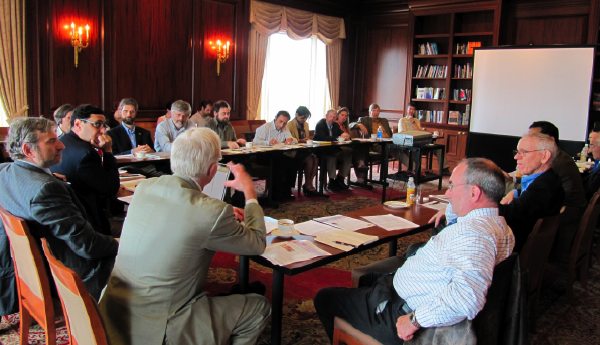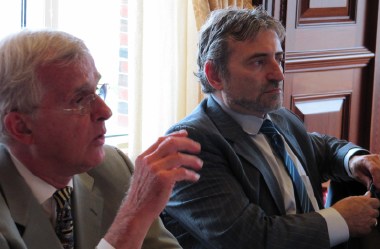BU Dialogue: How Can Universities Help Deal With Disasters and Emergencies
Some thirty faculty members and researchers from all across Boston University – including the College of Arts and Sciences, School of Medicine, the School of Public Health, School of Engineering, College of Communication, School of Social Work, and the Metropolitan College – attended the Dialogue on “The University’s Role in Dealing with Disasters and Complex Human Emergencies” organized by the Frederick S. Pardee Center for the Study of the Longer-Range Future and the Boston University Provost.

Held on Monday, May 3, 2010, the dialogue was an initial dialogue amongst various BU researchers who work on different aspects of complex humanitarian emergencies and disasters research. Brought together by the Pardee Center to discuss the potential and future role of knowledge in dealing with disasters and emergencies, the Dialogue was opened by the Boston University Provost Dr. David Campbell who emphasized the importance of disasters and emergencies as particularly complex inter-disciplinary challenges. In his remarks, the Vice President and Associate Provost for Research Dr. Andrei Ruckenstein encouraged the group to think about innovative ways for scientific collaboration around these challenges that would build around the University’s existing strengths. The discussion was moderated by Prof. Adil Najam, Director of the Frederick S. Pardee Center for the Study of the Longer-Range Future and Professor of International Relations, and of Geography and Environment.

Participants recognized that Boston University faculty and researchers are already producing impressive work in this and related areas but that better coordination and collaboration amongst those working on these issues is highly desirable. Discussions also touched on the need to incorporate a wider variety of approaches, tools and disciplines to the study of complex emergencies and disasters. The goal of the half-day meeting was to initiate a strategic, university-wide dialogue on the role of the university and academics – in general and in particular at Boston University – in disaster mitigation, post-disaster recovery, planning, and management, and dealing with complex humanitarian emergencies, and identify areas of potential intra-university collaboration and potential collaborations beyond BU. The meeting followed on a recent Pardee House Seminar on “Dealing With Disasters” which had discussed, among other aspects, the role of knowledge in dealing with disasters and complex human emergencies.
It was felt that future efforts should include: (a) creating a stronger knowledge community of those working on issues related to disasters and complex humanitarian emergencies, (b) identifying practical ways in which an improved enabling environment could be created for students, researchers and faculty working on these issues, (c) encouraging beneficial external relationships with practitioners and academics working on similar issues outside Boston University, and (d) identifying a few focused initiatives that this knowledge community could work on.